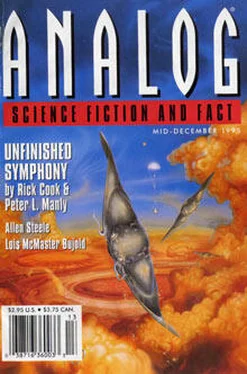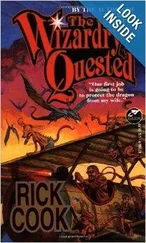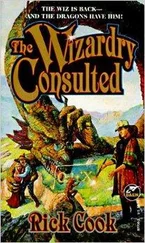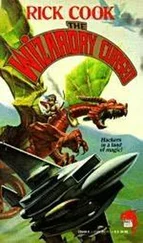Rick Cook - Unfinished Symphony
Здесь есть возможность читать онлайн «Rick Cook - Unfinished Symphony» весь текст электронной книги совершенно бесплатно (целиком полную версию без сокращений). В некоторых случаях можно слушать аудио, скачать через торрент в формате fb2 и присутствует краткое содержание. Год выпуска: 1995, Издательство: Dell Magazines, Жанр: Фантастика и фэнтези, на английском языке. Описание произведения, (предисловие) а так же отзывы посетителей доступны на портале библиотеки ЛибКат.
- Название:Unfinished Symphony
- Автор:
- Издательство:Dell Magazines
- Жанр:
- Год:1995
- ISBN:нет данных
- Рейтинг книги:5 / 5. Голосов: 1
-
Избранное:Добавить в избранное
- Отзывы:
-
Ваша оценка:
- 100
- 1
- 2
- 3
- 4
- 5
Unfinished Symphony: краткое содержание, описание и аннотация
Предлагаем к чтению аннотацию, описание, краткое содержание или предисловие (зависит от того, что написал сам автор книги «Unfinished Symphony»). Если вы не нашли необходимую информацию о книге — напишите в комментариях, мы постараемся отыскать её.
Unfinished Symphony — читать онлайн бесплатно полную книгу (весь текст) целиком
Ниже представлен текст книги, разбитый по страницам. Система сохранения места последней прочитанной страницы, позволяет с удобством читать онлайн бесплатно книгу «Unfinished Symphony», без необходимости каждый раз заново искать на чём Вы остановились. Поставьте закладку, и сможете в любой момент перейти на страницу, на которой закончили чтение.
Интервал:
Закладка:
Unfinished Symphony
by Rick Cook & Peter L. Manly

Illustration by Catherine Yankovich
The eternal storms raged below, churning the clouds into cyclones big enough to swallow the Earth entire. Even here, thousands of miles above the melted-ice-cream swirl of the planet, other storms raged, filling space with a hash of radio noise and a sleet of charged particles.
The visitor sailed on, an untroubled tiny speck against star-scattered space and the light show of the atmosphere alike. It had traveled a long and circuitous path from its source, flung out from Earth by a combination of puny rockets and the massive forces of gravity. For five years it had caromed about the inner Solar System, banking off the gravity fields of the Sun and Earth like a well-played shot in a game of cosmic pool. Now after all the waiting, the planning, the improvising—after hopes and dreams and careers built upon it, it was ready to do the job it was designed for.
The spacecraft had not made the trip unscathed. The main antenna stood partially unfurled aind crumpled like a broken butterfly’s wing, useless victim of a mischance in space, millions of miles from any hand to tug it gently open.
Yet Galileo was not alone. Another man-made object flew in loose formation with it. Until five months ago it had been part of Galileo in its long journey through the Solar System. Then, on command, the atmospheric probe had detached itself and drifted away Where the rest of the craft was lumpy with antennas and booms and other projections in cheerful disregard for considerations of streamlining, this piece was as smooth and curved as a stream-worn pebble. It was designed to plunge into Jupiter’s atmosphere and bring back news of conditions never before experienced by humans or their creations.
Behind them, above them, and below them loomed the fiery bulk of Jupiter, banded and braided and twisted in a thousand shades of orange and red and yellow and white.
The spacecraft were as incapable of being awed by the planet’s size as they were of being impressed by its beauty. Months from now, after the probe had transmitted information back to the orbiter and it had been forwarded bit by bit to Earth to be assembled and interpreted, then perhaps the humans who created the craft would be awed or impressed. But that was utterly beyond Galileo’s capabilities.
With a puff of gas from thrusters, the Galileo orbiter took a slightly different course from its companion, one calculated to just miss the planet. The companion would not miss at all. Indeed, it was not designed to miss. Its job was to dive into Jupiter’s atmosphere and send back word of what it found.
The probe’s builders had considered carefully, weighing the desire for information against mass, communications bandwidth, and a hundred other factors before settling on just six instruments to collect data in the hour or so before the device was crushed to extinction in the depths of the massive Jovian atmosphere. Six instruments to extract the maximum possible amount of information given the conditions the designers expected the probe to encounter.
And no one on Earth had a clue as to how wrong they were.
“Storm up ahead.” The Geek broke into the strained silence.
Ensign was well aware of the towering, roiling mass of lemon-yellow clouds several thousand wing lengths beyond. But he was glad for anything that broke the mood.
“It will be an active one,” he sang out in the middle frequencies. “A lot of lightning.”
“My skin is tingling already,” The Geek agreed. “We’ll need to steer well clear of it.”
Melody, the third surviving member of the Bach Choir, snorted on several selected frequencies to show she understood her pod-mates’ ploy all too well and wasn’t—quite—ready to oblige. The result shivered Ensign’s hearing membranes, but he took it as a good sign.
“Rich feeding to come, though,” The Geek sang judiciously. “A storm that big will bring up plenty of plankton.”
What The Geek actually said was considerably more complex. The speech of creatures who can talk and listen on a hundred or so frequencies simultaneously naturally carries much more information than any human language. Besides the banal comment on the weather, The Geek had expressed his people’s truism that change is eternal and that bad times often unfolded into good. He had added a certain amount of onomatopoeia for comic effect to show he said it in good spirits and, perhaps most importantly, it chided Melody for her attitude.
Melody snorted again, less forcefully this time.
The three soared in a loose triangular formation perhaps a hundred wing lengths above the yellow-and-cream cloud tops. Their manta bodies were buoyed by their internal hydrogen chambers and propelled by flapping their enormous wingtips. Each member of the pod would have covered most of a city block on Earth, but none of the High Folk could have survived an instant s exposure to Earth conditions.
All around them plankton welled up from the clouds below, growing and blossoming in the weak sunlight. The three had deployed feeding scoops and opened the gills along their massive flanks, forcing Jupiter’s atmosphere through their bodies and straining out the nourishing plankton.
Melody trilled a bell-like chime on a hundred frequencies at once. “Listen,” she sang with ringing overtones to remind the others of her singing abilities, “I know we have to have more members to be complete. But the Bach Choir is—was—the finest singers in our whole cloud belt. Snow has no clear voice and little musical imagination.”
“We also need singers who understand the songs they sing,” The Geek replied. “Snow already knows many of Old Simon’s songs of astronomy and computation. More, she will be able to use them as he did to predict the motions of the Heavens—she can already foretell moonshadows so Gatherings can take place.”
“She is barely old enough to leave her birth pod,” Ensign added. “She will mature.”
“But will she develop? She shows no sign of it. We need singers.”
“We also need memory,” Ensign sang back. “She can give us that ”
Ensign hefted the weight of his own memories—literally. Clinging to his flanks and body were dozens of remoras, torpedo-shaped symbiotes whose talent was remembering. When the pod had been shattered in Skyfall of multiple comet strikes, he and the other survivors had acquired many of the songs and memories of those lost.
“Flashing eyes and a pretty set of wingtips, you mean,” Melody retorted in mock derision. “Memory yes, but we need real singers if we are to be great again.”
“Besides,” The Geek said quietly, “we all lost some of our hearing in Skyfall. Others will sing more sweetly—but we have most of the memories and ancient knowledge from those who perished.”
* Someone finally said it,* Ensign thought. The thing they had been dancing around, not-quite-ignoring, ever since their harrowing dash to safety, away from the cloud bands hammered by comet strikes. The shockwaves had killed many of their pod mates, those who hadn’t elected to stay behind in the south or who had not been taken by sharks on that terrible journey. And the three survivors had not passed unscathed. None of them would ever be the singers they had been before Teacher warned them of Skyfall and led them North. Ensign wondered if the pod could even continue as a true choir.
“All the more reason to recruit only the best singers,” Melody trilled stubbornly. But Ensign could see her heart wasn’t in it any more.
Читать дальшеИнтервал:
Закладка:
Похожие книги на «Unfinished Symphony»
Представляем Вашему вниманию похожие книги на «Unfinished Symphony» списком для выбора. Мы отобрали схожую по названию и смыслу литературу в надежде предоставить читателям больше вариантов отыскать новые, интересные, ещё непрочитанные произведения.
Обсуждение, отзывы о книге «Unfinished Symphony» и просто собственные мнения читателей. Оставьте ваши комментарии, напишите, что Вы думаете о произведении, его смысле или главных героях. Укажите что конкретно понравилось, а что нет, и почему Вы так считаете.












